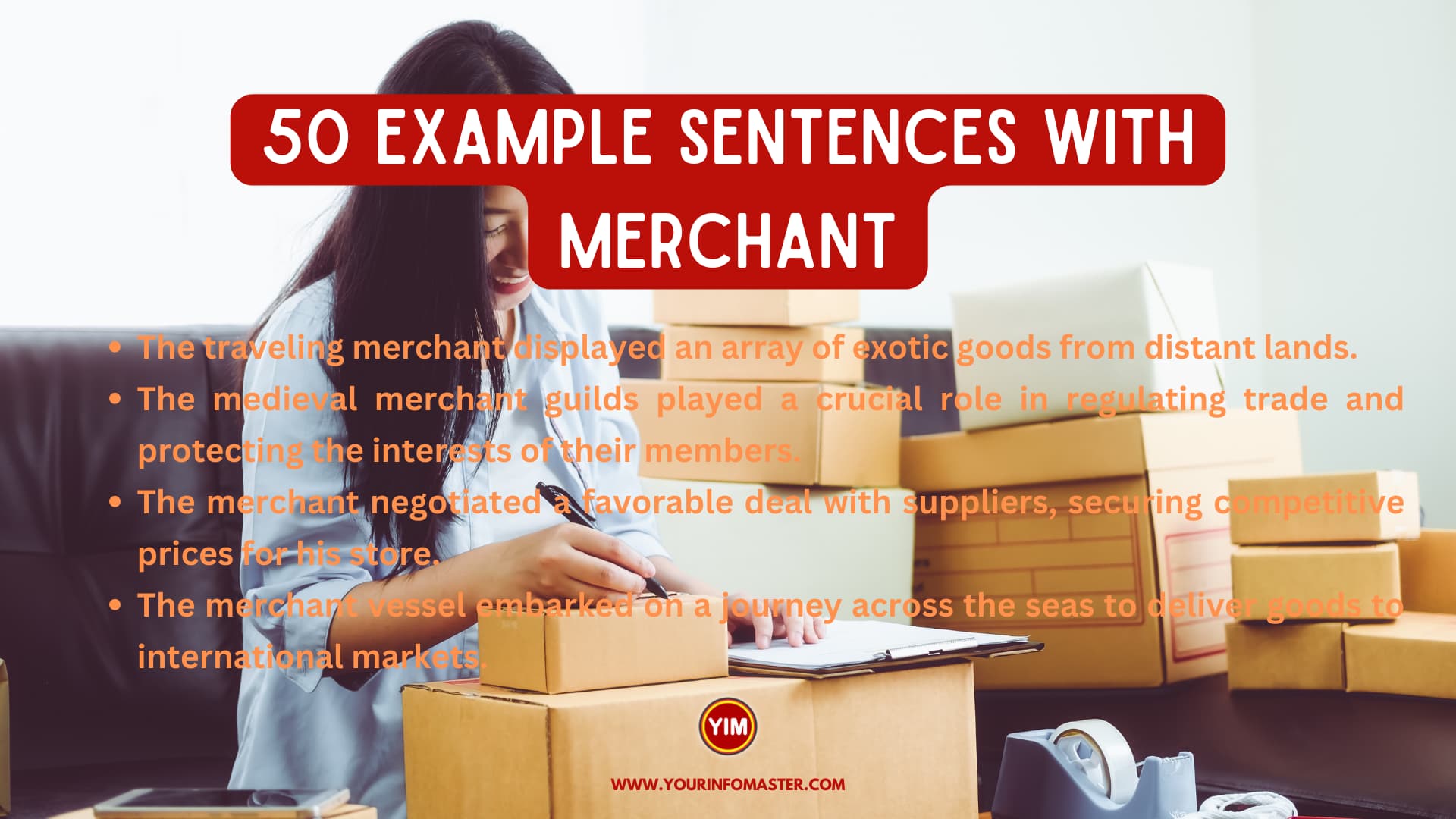In this article, I am going to provide a list of “50 Sentences with Merchant“.
The word “merchant” carries significant historical and commercial connotations, representing the essence of trade and business. With origins in the Latin term “mercator,” meaning “trader” or “buyer,” the concept of a merchant has evolved throughout history. In this blog post, we will explore the meaning of a merchant, delve into its synonyms and antonyms, provide real-world examples, and present a comprehensive list of 50 sentences that exemplify its usage.
Check also: 50 Sentences with Misleading
What is the meaning of Merchant?
A merchant is an individual or entity engaged in the purchase, sale, or exchange of goods or services, typically for profit. Merchants play a vital role in the economy, facilitating trade and commerce by connecting producers with consumers. They can operate in various sectors, such as retail, wholesale, e-commerce, or international trade. Merchants navigate market dynamics, manage inventory, negotiate deals, and strive to meet the demands of their customers.
Synonyms: trader, retailer, vendor, seller, dealer.
Antonyms: buyer, consumer, customer, shopper, purchaser.
Real-World Examples of Merchant
- The local grocery store owner is a prime example of a merchant. They procure products from suppliers, maintain a store inventory, and sell goods to customers within the community. The merchant’s role involves ensuring the availability of products, providing quality customer service, and managing pricing and promotions.
- In the era of e-commerce, online marketplaces such as Amazon have transformed into global merchants. They connect buyers and sellers from around the world, offering a wide range of products and providing a platform for businesses to reach a vast customer base. These digital merchants handle transactions, logistics, and customer support to facilitate seamless online shopping experiences.
50 Sentences with Merchant
Here is a list of 50 Sentences with Merchant:
Check also: What is the difference between machine learning and artificial intelligence?
- The traveling merchant displayed an array of exotic goods from distant lands.
- The medieval merchant guilds played a crucial role in regulating trade and protecting the interests of their members.
- The merchant negotiated a favorable deal with suppliers, securing competitive prices for his store.
- The merchant vessel embarked on a journey across the seas to deliver goods to international markets.
- The local farmers’ market featured various merchants selling fresh produce, baked goods, and handmade crafts.
- The antique dealer acted as a merchant, buying and selling valuable collectibles to avid collectors.
- The digital age has witnessed a significant rise in online merchants, who leverage e-commerce platforms to reach customers worldwide.
- The street merchant skillfully promoted his products, attracting passersby with enticing offers.
- The wholesale merchant supplied goods to retailers, ensuring a steady flow of products in the market.
- The merchant’s success depended on his ability to identify consumer trends and adapt his offerings accordingly.
- The merchant traveled to trade fairs, showcasing his merchandise and establishing business connections.
- The textile merchant sourced fabrics from different countries, offering a diverse range of materials to his customers.
- The merchant’s shop was adorned with colorful displays, inviting customers to explore the merchandise.
- The merchant provided credit options to customers, allowing them to make purchases and settle payments later.
- The online auction platform facilitated interactions between merchants and buyers, enabling competitive bidding on rare items.
- The spice merchant imported aromatic spices from around the world, catering to the culinary needs of chefs and cooking enthusiasts.
- The merchant participated in trade missions to foreign countries, expanding his business networks and exploring new market opportunities.
- The local craft fair showcased the talent and creativity of artisans and merchants, supporting the local economy.
- The merchant’s reputation for fair pricing and quality products attracted loyal customers to his store.
- The merchant established strategic partnerships with suppliers, ensuring a steady and reliable source of merchandise.
- The traveling merchant faced various challenges, including language barriers and cultural differences, while conducting business in foreign lands.
- The merchant’s success relied on effective inventory management, balancing supply and demand to meet customer needs.
- The merchant utilized digital marketing strategies to expand their online presence and attract a wider customer base.
- The fair trade movement emphasized ethical practices and ensured that merchants provided fair compensation to producers in developing countries.
- The merchant leveraged market research and data analysis to identify emerging trends and adapt their product offerings accordingly.
- The merchant invested in customer relationship management systems to enhance customer satisfaction and foster long-term loyalty.
- The merchant’s success hinged on their ability to differentiate themselves from competitors through unique product offerings or exceptional customer service.
- The traveling merchant encountered diverse cultures and customs, adapting their selling techniques to resonate with local customers.
- The merchant attended industry conferences and trade shows to stay updated on the latest market trends and innovations.
- The online merchant utilized search engine optimization techniques to increase visibility and attract organic traffic to their website.
- The merchant offered discounts and promotions to incentivize customers to make purchases, driving sales and revenue.
- The merchant’s storefront displayed eye-catching signage and attractive window displays to entice passersby into their store.
- The merchant embraced sustainable practices, opting for eco-friendly packaging and supporting environmentally conscious brands.
- The merchant carefully analyzed market demand to determine which products to stock and which to phase out.
- The merchant participated in local community events and sponsorships to build brand awareness and foster goodwill.
- The merchant ensured secure payment processing systems to protect customer data and instill trust.
- The merchant expanded their business through online marketplaces, reaching a broader customer base beyond their physical location.
- The merchant provided personalized recommendations and tailored shopping experiences to enhance customer satisfaction.
- The traveling merchant faced risks such as piracy and adverse weather conditions during their sea voyages.
- The merchant offered a generous return policy, prioritizing customer satisfaction and building trust in their brand.
- The merchant employed skilled sales staff trained in effective communication and product knowledge to assist customers.
- The online merchant implemented customer reviews and ratings, providing social proof and aiding purchase decisions.
- The merchant collaborated with influencers and bloggers to increase brand visibility and drive sales.
- The merchant attended industry trade fairs to source new and unique products to offer their customers.
- The merchant diversified their product range to cater to changing consumer preferences and market demands.
- The merchant leveraged social media platforms to engage with customers, share updates, and promote special offers.
- The merchant networked with other merchants and industry professionals to exchange insights and best practices.
- The merchant employed data analytics tools to analyze customer behavior and preferences, enabling targeted marketing campaigns.
- The merchant invested in continuous professional development to stay updated on industry trends and improve business strategies.
- The merchant celebrated customer loyalty by offering exclusive perks and rewards programs.
Check also: What is difference between 4G and 5G?
Conclusion
Merchants play a vital role in the world of commerce, facilitating trade, and connecting buyers with sellers. Through the exploration of the meaning of a merchant, its synonyms, and antonyms, we have gained a deeper understanding of their significance. The real-world examples have highlighted the diverse contexts in which merchants operate, from local businesses to global e-commerce platforms. The list of 50 sentences has exemplified the various aspects of a merchant’s role, from sourcing products to customer engagement. Merchants are integral to economic growth, offering goods and services while driving innovation and creating opportunities for both buyers and sellers.
See also: What is the difference between medicare A and B?
If you really enjoyed the article “50 Sentences with Merchant?,” then I would be very grateful if you’d help it spread by emailing it to your friends or sharing it on Twitter, Instagram, or Facebook. Thank you!
Have you read “50 Sentences with Merchant?“ Which of these blogs are you reading, and how is it similar to one of them?







